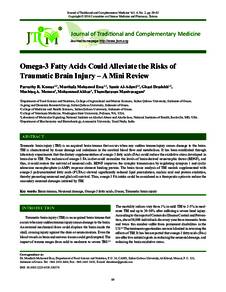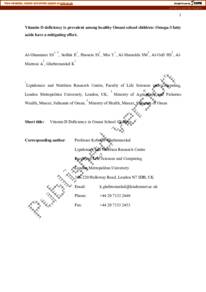Document
Omega-3 fatty acids could alleviate the risks of traumatic brain injury : a mini review.
Identifier
DOI: 10.4103/2225-4110.130374
Contributors
Essa, Musthafa Mohamed., Author
Al-Adawi, Samir., Author
Dradekh, Ghazi., Author
Memon, Mushtaq A., Author
Akbar, Mohammed., Author
Manivasagam, Thamilarasan., Author
Publisher
National Taiwan University.
Gregorian
2014-04
Language
English
English abstract
Traumatic brain injury (TBI) is an acquired brain trauma that occurs when any sudden trauma/injury causes damage to the brain. TBI is characterized by tissue damage and imbalance in the cerebral blood flow and metabolism. It has been established through laboratory experiments that the dietary supplementation of omega-3 fatty acids (FAs) could reduce the oxidative stress developed in brain due to TBI. The inclusion of omega-3 FA in diet could normalize the levels of brain-derived neurotrophic factor (BDNF), and thus, it could restore the survival of neuronal cells. BDNF improves the synaptic transmission by regulating synapsin 1 and cyclic adenosine monophosphate (cAMP) response element binding protein. The brain tissue analysis of TBI models supplemented with omega-3 polyunsaturated fatty acids (PUFAs) showed significantly reduced lipid peroxidation, nucleic acid and protein oxidation, thereby promoting neuronal and glial cell survival. Thus, omega-3 FA intake could be considered as a therapeutic option to reduce the secondary neuronal damages initiated by TBI.
Member of
ISSN
2225-4110
Resource URL
Category
Journal articles


